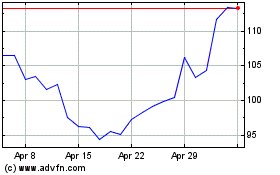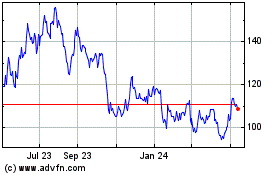BEIJING—China's ride-hailing champion, after besting Uber
Technologies Inc., appears to be facing a tougher opponent in
domestic regulators.
Several major cities issued proposed industry regulations in
recent days that would restrict the types of vehicles that can be
used and who can drive them, potentially crimping a large chunk of
Didi Chuxing Technology Co.'s business. Meanwhile, the country's
antitrust regulators continued to investigate Didi's deal to
acquire U.S.-based Uber's China unit.
Didi issued a strongly worded protest over the weekend against
the draft regulations from Beijing, Shanghai, Shenzhen and at least
three other major cities. The company said the rules, if adopted in
their current form, would force "the vast majority" of its drivers
and cars off the road.
"Millions of online ride-hailing drivers may be about to lose
their jobs and paychecks, which would mean millions of families may
lose an important income source," Didi said in its statement.
Didi's open criticism of the government's plans marked a rare
departure from common practice for a Chinese company. Didi has
previously said it welcomed regulation of the evolving ride-hailing
sector, and the company, one of China's hottest startups with a
valuation of more than $33 billion, had been enjoying smooth going
in recent months.
China's national regulators this summer officially legalized the
sector, which had operated in a gray area. Didi's main rival, Uber,
ceded the market after a costly competition in which the companies
subsidized rides. Didi added Apple Inc., Foxconn Technology Group
and Baidu Inc. this year to its investor list, which already
includes Chinese internet majors Tencent Holdings Ltd. and Alibaba
Group Holding Ltd. In recent months, Didi began reducing subsidies
and raising fares.
Local Chinese traffic regulators have remained skeptical of
Didi, concerned about whether its drivers are adding to traffic
congestion and competing with established taxi companies. Antitrust
regulators also began scrutinizing Didi's pricing power after the
company said in August it agreed to acquire Uber's China unit. The
combined entity, in which Uber and other investors would have a 20%
stake, is likely to account for an overwhelming share of rides, if
Didi's and Uber's track records hold.
"We must maintain our strategy of prioritizing public
transportation to use the road resources reasonably, decrease the
use of motor vehicles and ease traffic congestion," Beijing's
municipal traffic authority posted on its Weibo social-media
account, in remarks similar to those issued by the other
cities.
The draft rules from Beijing, Shanghai and Shenzhen would limit
drivers to those with local residency permits, and require cars to
meet size restrictions and have Global Positioning System and
emergency alert devices installed. Some cities plan to require
ride-hailing vehicles to have a minimum wheelbase, which would rule
out some small compact cars.
The rules may be amended before being adopted. National
regulations for the ride-hailing sector were less restrictive when
adopted than they were in a first draft issued last year.
In their current form, the latest rules are likely to make Didi
a more expensive service, with fewer drivers and passengers,
analysts said. "The era in which ride-hailing services are
significantly cheaper than taxis or other special car services is
gone," said Xiaofeng Wang, a China internet sector analyst for
Forrester.
By requiring local residency permits, the rules take particular
aim at a mainstay of the 14 million drivers Didi relies on—migrant
workers who generally work for lower pay than local residents.
Didi said Saturday that only less than 2.4% of its drivers in
Shanghai were local residents. A spokeswoman didn't reply to
requests to explain why this percentage is far lower than the 69%
the company cited last year.
Some Didi passengers joked that the new rules would make the
company's drivers desirable dating prospects, with the pool limited
to those with good quality cars and sought-after big-city residence
permits.
For migrant drivers, however, the proposed regulations are
creating uncertainty. Ge Wanjiang, who works and lives in Beijing,
bemoaned that the might be forced back to his hometown, the eastern
city of Heze. The 43-year-old said he purchased a Volkswagen
Santana with his savings two months ago so he could work as a
driver for UberChina, which Didi is buying.
"If the policy does not allow us to drive as an Uber driver in
Beijing, how do I deal with my car?" Mr. Ge said. "I have to go
back to Heze, but it will be useless in my hometown."
Chinese experts have been divided on regulation of the sector,
with some arguing for a lighter touch to help boost new internet
businesses, while others urge caution.
"We have to understand that ride-hailing via the internet is
still a taxi service at some point," said Li Junhui, a scholar at
the China University of Political Science and Law. "This industry
should develop moderately instead of with great force."
Yang Jie and Kersten Zhang contributed to this article.
Write to Eva Dou at eva.dou@wsj.com
(END) Dow Jones Newswires
October 10, 2016 10:05 ET (14:05 GMT)
Copyright (c) 2016 Dow Jones & Company, Inc.
Baidu (NASDAQ:BIDU)
Historical Stock Chart
From Mar 2024 to Apr 2024

Baidu (NASDAQ:BIDU)
Historical Stock Chart
From Apr 2023 to Apr 2024
